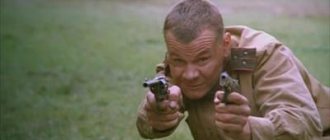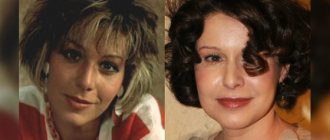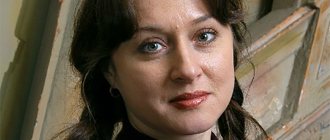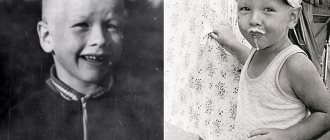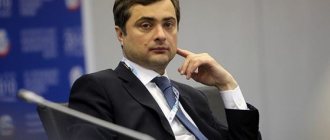The great actor Strzhelchik Vladislav Ignatievich created many images in cinema and on the theater stage. The story of his success is a path that only a gifted person can travel. A kaleidoscope of roles, an endless series of romantic and friendly meetings, victories and disappointments - everything was passed and lived in a sophisticated, beautiful, aristocratic sophistication. His life is the rapid flight of a bright star.
Biography of Vladislav Strzhelchik
On January 31, 1921, a second child was born into the family of St. Petersburg intellectuals - the future famous actor Vladislav Strzhelchik. His father, being a Pole by nationality, was particularly pious. As a child, Vladik often attended masses in the church, observing the sacrament of action. Perhaps it was at this time that his interest in the theater arose, in which, like in a temple, everything is subordinated to a certain general order and filled with mystery.
Vladik was no different from ordinary boys - he loved to play, run, and be sure to treat himself to something tasty. Studying at school interested him little. Much more attractive were the classes at the theater studio at the Bolshoi Drama Theater in Leningrad.
During the Great Patriotic War, theatrical performances were replaced by cruel reality. Service in the infantry, meager military rations, loss of friends, starving parents in besieged Leningrad. Vladislav found an opportunity to get through all the obstacles in order to take part of the soldiers’ rations to his mother and father. After the war, Vladislav joined the BDT, where he would work until the end of his life. His main creative directions will be the theater stage in his native St. Petersburg and filming.
In the photo: Vladislav Strzhelchik in his youth
His film masterpieces
Vladislav Strzhelchik has developed a long and warm friendship with cinema. There were a lot of roles, all real, voluminous, excluding any stereotypes. It was never possible to say that any character was accidental for the actor. He was the Roman ruler from “A Courtesy Visit” and Scrambled Eggs from “The Marriage,” Andrei Tupolev in “The Poem of Wings” and the adventurer Naryshkin from “The Crown of the Russian Empire,” fearlessly walking on his hands along the parapet of the Eiffel Tower.
The role of a good man and excellent aircraft designer Andrei Nikolavich Tupolev turned out to be both rewarding and difficult. This character was very bright, large-scale, simply amazing. This personality had everything: both the person and the era.
In another film - “His Excellency's Adjutant” - he very carefully entered into the everyday life of the heroes, into their personal lives. And this work itself is quite chamber in its form. It demanded from Strzhelchik several other details in the characterization of his hero, other details.
Vladislav Strzhelchik: personal life
The personal life of Vladislav Strzhelchik is a series of love interests. Women have always occupied an honorable place in the actor’s life. He knew how to approach them and was able to arouse interest at first sight. Vladislav Ignatievich was a gallant gentleman, but a very fickle husband. Women fell in love with him, but could not keep the Master of the Stage near them for long, as many new hobbies awaited him.
Strzelchik in the film “The Servant of Two Masters”
The stormy personal life of Vladislav Strzhelchik gave rise to a lot of gossip and was the reason for the emergence of more and more new stories about illegitimate heirs. The second wife of Vladislav Strzhelchik was the only woman who was able to keep the fickle, loving Vladislav Ignatievich next to her for a long time. At the same time, he stayed with her not out of habit, but, truly, experiencing a feeling of love for her. Regardless of any hobbies.
Vladislav Strzhelchik and Lyudmila Shuvalova
The love of Vladislav Strzhelchik and Lyudmila Shuvalova arose despite all condemnations and prohibitions. The actor was married and had a daughter growing up. And suddenly that feeling of boundless, fantastic happiness, which is so necessary for creative individuals in order not to perish, burst into his measured life.
Vladislav Strzhelchik and Lyudmila Shuvalova
The holiday romance between a St. Petersburg stage luminary and an aspiring Moscow actress could become something more than a simple affair. The first wife of Vladislav Strzhelchik learned about her husband’s new relationship from himself. After the divorce, Vladislav did not formalize his relationship with his new wife for another 7 years. Lyudmila showed incredible patience in everything. She guarded every moment of their relationship like a cup of precious water.
Lyudmila was able to create an almost ideal atmosphere in the house. She belonged to the category of impeccable housewives, remaining an interesting and unusually wise wife. Her reaction to her husband's hobbies was always absolutely calm. And it was not indifference, but the strength of female character.
Creation
- 1946 - “Much Ado About Nothing” by W. Shakespeare. StagingI. Yu. Shlepyanova - Claudio
- 1948 - “Enemies” by M. Gorky. Staged by N. S. Rashevskaya - Grekov
- 1950 - “The Secret War” by V. Mikhailov and L. Samoilov. Production by PP Suslovich - Dmitry Kazin
- 1950 - “The Fault” by B. Lavrenev; directors A. V. Sokolov and I. S. Sonne - Polevoy
- 1951 — “Yarovaya Love” by K. Trenev; director S. Efremov - Yarovoy, dance manager
- 1951 - “The Snow Maiden” by A. Ostrovsky; production by I. S. Efremov - Lel
- 1951 - “Dostigaev and others” by A. M. Gorky. Staged by N. S. Rashevskaya - Viktor Nestrashny
- 1952 - “Apple Branch” by B. Dobrovolsky and Y. Smolyak; production by A. V. Sokolov and E. Z. Kopelyan - Volodya
- 1952 - “Ruy Blas” by V. Hugo. Staged by I. S. Efremov - Ruy Blaz
- 1953 - “Prologue” by A. Stein; production by A. V. Sokolov - Fedor
- 1953 - “The Servant of Two Masters” by C. Goldoni; production by G. G. Nikulin - Florindo Aretusi
- 1956 - “Nameless Star” by M. Sebastian. StagingG. A. Tovstonogova - Grieg
- 1957 - “The Idiot” based on the novel by F. M. Dostoevsky. Staged by G. A. Tovstonogov - Ganya Ivolgin
- 1959 - “Barbarians” by A. M. Gorky. Staged by G. A. Tovstonogov - Tsyganov
- 1961 - “The Fourth” by K. Simonov. Staged by G. A. Tovstonogov - He
- 1962 - “The Divine Comedy” by I. Stock. Staged by G. A. Tovstonogov - Angel D.
- 1962 - “Woe from Wit” by A. S. Griboyedov. Staged by G. A. Tovstonogov - Repetilov
- 1963 - “The Career of Arturo Ui” by B. Brecht. Production by E. Axer - Actor
- 1965 - “Three Sisters” by A.P. Chekhov. Staged by G. A. Tovstonogov - Kulygin
- 1966 - “The Idiot” based on the novel by F. M. Dostoevsky (2nd edition). Staged by G. A. Tovstonogov - Epanchin
- 1966 - “...The truth! Nothing but the truth!!" D. Alya. Production by G. A. Tovstonogov - Overman
- 1967 - “Traditional collection” by V. Rozov. Staged by G. A. Tovstonogov - Alexander Mashkov
- 1969 - “King Henry IV” by W. Shakespeare. Staged by G. A. Tovstonogov - Heinrich Percy
- 1969 - “The Price” Arthur Miller; director R. A. Sirota - Gregory Solomon
- 1970 - “The Third Watch” by G. Kapralov, S. Tumanov. Staged by G. A. Tovstonogov - Nikolai Bauman
- 1971 - “Toot, others and the major” by I. Erken. Staged by G. A. Tovstonogov - Professor Cipriani
- 1972 - “Khanuma” by Tsagareli. Staged by G. A. Tovstonogov - Prince Vano Pantiashvili
- 1975 - “Three bags of weedy wheat” by V.F. Tendryakov. Staged by G. A. Tovstonogov - Adrian Fomich
- 1976 - “Summer Residents” by A. M. Gorky. Staged by G. A. Tovstonogov - Shalimov
- 1978 - “The Bourgeois” by A. M. Gorky. Staged by G. A. Tovstonogov - Teterev
- 1978 - “The Pickwick Club” by Charles Dickens. Staged by G. A. Tovstonogov - Sam Weller
- 1980 - “Wolves and Sheep” by A. N. Ostrovsky. Staged by G. A. Tovstonogov - Berkutov
- 1982 - “Amadeus”, based on the play by P. Schaeffer. Staged by G. A. Tovstonogov and Yuri Aksyonov - Salieri
- 1985 - “The Last Ardent Lover” by N. Simon. Staged by G. A. Tovstonogov - Barney Cashman
- 1985 - “Simplicity is enough for every wise man” by A. Ostrovsky. Staged by G. A. Tovstonogov - Gorodulin
- 1987 - “At the Lower Depths” by A. M. Gorky. Production by G. A. Tovstonogov - Actor
- 1993 - “Ghosts” by E. de Filippo. Staged by T. N. Chkheidze - Pasquale
Works on television
- 1969 - “The Death of Vazir-Mukhtar” based on Y. Tynyanov (television play); directors: Rosa Sirota, Vladimir Recepter - Chaadaev
- 1971 - “Fiesta” based on E. Hemingway’s novel “The Sun Also Rises” (television play); director Sergei Yursky.
- 1965 - “Loyal Robot” according to Art. Lemu (teleplay); director Ivan Rassomakhin - Robot Master
- 1942 - Mashenka - White Finnish officer (uncredited)
- 1949 - Academician Ivan Pavlov - high school student
- 1953 - Servant of Two Masters - Florindo
- 1957 - Next to us - Zybin
- 1957 - Baltic Glory - Baturin
- 1958 - Kochubey
- 1958 - In the days of October - adjutant of Klepikov
- 1958 - Andreika - officer
- 1960 - Resurrection - Count Schönbrock
- 1961 - Baltic sky - Gromeko
- 1963 - The Enchanted Wanderer - Prince
- 1964 - Garnet bracelet - Nikolai Nikolaevich
- 1964 - Dream - Nicholas I
- 1965 - Death of the squadron - Knoris
- 1965 - What should we call you now? - General Bruno Gottburg, aka Alphonse Correl
- 1965 - Third youth - Nicholas I
- 1967 - On the wild shore - director of the institute
- 1967 - Green Carriage - Nicholas I
- 1967 - General Rakhimov - Fricke
- 1967 - Spring on the Oder - Krasikov
- 1967 - War and Peace - Napoleon Bonaparte
- 1967 - Major Whirlwind - Berg
- 1967 - Sofya Perovskaya - Alexander II; investigator
- 1967 - Touches to the portrait of V. I. Lenin - doctor
- 1968 - Our friends - Kapilitsyn
- 1968-1972 - Liberation - General Antonov
- 1969 - Old acquaintance
- 1969 - Tchaikovsky - Nikolai Rubinstein
- 1969 - He was not alone
- 1969 - Adjutant to His Excellency - General Kovalevsky
- 1970 - The end of the chieftain - chieftain Dutov
- 1970 - Peace to huts - war to palaces - Vladimir Vinnichenko
- 1970 - Collapse of the Empire - Protopopov
- 1971 - Crown of the Russian Empire, or Elusive Again - Naryshkin
- 1972 - Courtesy visit - Roman ruler
- 1972 - Privalov's millions - Polovodov
- 1972 - Labeled Atom - Pyotr Mikhailovich Brunov, Colonel General
- 1973 - Open Book - Valentin Kramov
- 1974 - Blockade - Fedor Valitsky
- 1974 - Origins - Matvey Krupnov
- 1974 - Dear Boy - McDonnell, Gangster Chief
- 1974 - My destiny - Gennady Barabanov
- 1974 - Straw Hat - Nanencourt
- 1974 - The Tale of the Human Heart - Ilya Kapitonovich, surgeon, official
- 1975 - Star of Captivating Happiness - Laval
- 1976 - Always with me... - Andrey Ilyin
- 1976 - The Tale of an Unknown Actor - Mikhail Tverskoy
- 1976 - Crime - Karetnikov
- 1977 - Marriage - Scrambled Eggs
- 1977 - Funny people! - husband
- 1977 - Front behind the front line - General Antonov
- 1978 - Colonel Shaber - Shaber
- 1978 - Extra people
- 1978 - Father Sergius - Nicholas I
- 1978 - Midnight Robbery
- 1979 - Poem about wings - Tupolev
- 1980 - Pious Martha - Don Gomez
- 1980 - My dad is an idealist - Sergei Yuryevich Petrov
- 1981 - Facts of the past day - Vasily Maksimovich Sorogin
- 1981 - Front behind enemy lines - General Antonov
- 1982 - Two Voices (Idealist) - Nikolai Alekseevich
- 1982 - Here is the window again...
- 1982 - Treasure Island - Squire Trelawney
- 1981-1982 - Young Russia - Urquhart
- 1984 - Time of Desires - Nikolai Nikolaevich
- 1984 - Rest time from Saturday to Monday - Alexey
- 1984 - European History - Hayden
- 1984 - Following
- 1984 - Lights - banker Polulaki
- 1984 - Pericola - Panatelias
- 1986 - Voice (short film) - neurologist
- 1986 - Face to face - Prince Evgeny Rostopchin
- 1986 - The Secret of the Snow Queen - Baron
- 1987 - Midshipmen, forward! — Lestok
- 1987 - Corral - General George Bell
- 1991 - Crazy - Cuckold General
- 1992 - Tartuffe - Orgone
- 1993 - Vladimir the Holy - Vladimir Svyatoslavich
- 1993 — Provincial benefit performance
- 1994 - Tragedy of the Century - General Antonov
The most interesting
Actresses who received the Golden Raspberry for Worst Actress (02/13/2020)
Actors and actresses who left in 2020 (10/21/2017)
Vladislav Ignatievich’s communication with his only daughter Marina, born in his first marriage, was kept to a minimum after the divorce from her mother. Marina was raised by her stepfather, and it seems that neither Marina nor her real father felt the need for frequent communication. Even gifts for Marina were usually bought by Lyudmila Shuvalova, and Vladislav Ignatievich only gave them.
Strzhelchik’s second wife said that sometimes the topic of having a baby was raised in their family, but she understood that Vladislav would immediately feel the lack of attention with the birth of the child. It could ruin their marriage just like the first one. For this reason, Lyudmila never decided to become a mother.
Three sons are considered illegitimate children of Strzhelchik - Ilya, Evgeniy and Dmitry. They were all born from different women. Vladislav Strzhelchik considered his daughter Marina his only child; he did not recognize other children.
Is Dmitry Isaev an illegitimate son?
In the biography of Vladislav Strzhelchik there were many love stories with continuations. The actor was easily carried away, but these feelings rarely developed into something serious. Only one of the romantic stories of the St. Petersburg actor was on everyone’s lips. His relationship with the young BDT make-up artist Yulia took place during his second marriage. It is difficult to hide such feelings in a theatrical environment, and many were aware of their romance.
In January 1973, Julia had a son, Dmitry. According to the young woman, the father of the child was Vladislav Strzhelchik. The famous actor himself never acknowledged his paternity until the end of his life. However, many noted Dmitry’s similarities with Vladislav. Over time, the young man showed bright acting abilities, and he devoted his life to stage and cinema.
Presumably the illegitimate son of Vladislav Strzhelchik Dmitry
At the funeral of Vladislav Strzelchik, many noticed a young man crying at the coffin. It was the unrecognized great actor Dmitry Isaev. The mystery of his birth remained unsolved.
Movies
Vladislav Strzhelchik began acting in films in 1942. His first screen image was that of a Finnish White Guard officer in the film Mashenka. But popularity came to the actor much later, 23 years later, when he played General Gotburg in the film “What should we call you now?”
Vladislav Strzhelchik in the film “What should we call you now?”
Many of his roles became classics of Soviet cinema. He was equally good at portraying Napoleon in War and Peace, the swindler Naryshkin in The Crown of the Russian Empire, the father of the bride in The Straw Hat, Lestocq in Midshipmen, Forward!
Vladislav Strzhelchik in the film “War and Peace”
In 1965, the artist was awarded the title of People's Artist of the RSFSR, and 9 years later he became People's Artist of the USSR. He was also engaged in teaching activities: he taught at the Leningrad Institute of Theater, Music and Cinema in 1959-1968, at the Leningrad Institute of Culture - since 1966.
Vladislav Strzhelchik in the film “Midshipmen, Forward!”
Vladislav Strzhelchik’s last film works were roles in the films “Pericola” (1984), “Face to Face” (1986), “Tartuffe” (1992), “Provincial Benefit” (1993), “Tragedy of the Century” (1994).
Vladislav Strzhelchik was married twice. His first wife Olga Mikhailovna gave birth to the actor’s daughter Marina. But family relationships did not work out. Vladislav continued to live with his wife for the sake of the child until he met Lyudmila Shuvalova. Their acquaintance happened in the south, where both were on tour. Lyudmila was 24 years old, Vladislav was 30. She was from Moscow, he was from St. Petersburg. After returning, the actor immediately called her, came to Moscow when he could escape. Soon the couple decided to live together.
Vladislav Strzhelchik and Lyudmila Shuvalova
Vladislav left the family, and the happy lovers settled in a rented room without windows. The move to Leningrad frightened Lyudmila's parents, but they let their daughter go. They lived in a civil marriage for seven years, and then got married.
There were no children in this union - Lyudmila Pavlovna deliberately abandoned motherhood, devoting herself to her husband. His life was busy with the theater, and all household chores fell on the shoulders of his wife. He adored his wife and the cozy home, which was always clean and elegant.
Vladislav Strzhelchik and Dmitry Isaev
Strzhelchik was very jealous, and Shuvalova turned a blind eye to his novels. Let us note that the famous actor Dmitry Isaev is considered in the media and the acting community to be the illegitimate son of Vladislav Ignatievich. However, as the actor’s widow says, this topic was closed in their house. Strzhelchik almost did not communicate with his daughter, and did not recognize his son during his lifetime. For the first time Lyudmila Pavlovna saw the young man at her husband’s funeral.
Acting career
Strzhelchik's acting path was very multifaceted. An endless number of images, changing roles, famous partners. He treated his work in cinema as responsibly as he did in theatrical productions. The first roles were the supporting characters. But Strzhelchik played even small, episodic fragments in such a way that they were remembered by the audience. The debut film of the young artist was the film “Mashenka”, filmed at the beginning of the war, in 1942. The military uniform suited Strzelchik’s aristocratic bearing, and there were many offers of military roles in his acting career.
Vladislav Ignatievich was a versatile actor. He could make the viewer laugh, or, on the contrary, make him think. But, most importantly, he never left anyone indifferent to his heroes.
Theater career
The theatrical biography of Vladislav Strzhelchik began in post-war Leningrad with the actor’s debut performance on the stage of the Bolshoi Drama Theater. His first role was the noble lover Claudio in the play based on William Shakespeare's play Much Ado About Nothing. This was followed by roles in the productions “Enemies”, “The Servant of Two Masters”, “Girl with a Jug”. Later, Strzhelchik’s dramatic talent would be fully revealed in the plays “Cliff”, “Barbarians”, “Three Sisters”.
Vladislav Strzhelchik on the stage of the theater
Strzhelchik created stage characters very accurately, literally living into them. Vladislav Ignatievich’s attitude to work has always been responsible. He always showed up for rehearsals on time and did not allow himself and his partners to memorize the texts somehow. He followed all the director’s instructions exactly, and during the entire period of work he never showed up to the performance in bad shape.
Colleagues on stage unanimously insisted that working with Strzelchik was a pleasure. He was precise, understandable, and not capricious. In addition, Vladislav Ignatievich always had a keen sense of his stage partner. The last appearances on stage were not easy for Strzhelchik. He began to forget texts and suffered from headaches. At the end of his theatrical career, Vladislav Ignatievich played in the same beloved Bolshoi Drama Theater.
Films with Vladislav Strzhelchik
Actor Vladislav Strzhelchik devoted most of his life to cinema. He created comical and dramatic images, living them rather than playing them on the silver screen. The films succeeded each other, the talented artist constantly received offers for characteristic roles, and played them especially, with soul.
Strzelchik in the film “Enemies” (1953)
The actor’s debut role was the image of a White Finnish officer in the film “Mashenka”, filmed in 1942. There will be many films in which Vladislav Ignatievich Strzhelchik reveals the strength and nobility of the characters of people who devoted themselves to military affairs.
Actor in the film "His Excellency's Adjutant"
The most striking roles in the actor’s film biography were the images of General Kovalevsky in the film “His Excellency’s Adjutant” and the French commander Napoleon in the film “War and Peace.” Interesting images were created by Strzhelchik in the films “The Crown of the Russian Empire, or Elusive Again,” “Straw Hat,” “Marriage,” “Midshipmen, Go!”, “Poem of Wings,” “Tartuffe.”
Recognition and merit
- Municipal Prize of the RSFSR named after the Vasilyev brothers (1971) - for the role of General Kovalevsky in the TV series “His Excellency’s Adjutant”)
- Honored Artist of the RSFSR (1954)
- People's Artist of the RSFSR (1965)
- People's Artist of the USSR (1974)
- Hero of Socialist Labor (1988)
- Order of Lenin (1988)
- Order of the October Revolution (1981)
- Order of the Russian War, II degree (1985)
- Medal "For the Defense of Leningrad" (1943)
- Medal "For Military Merit" (1944)
- Prize of the International Dramatic Society "For contribution to the development of dramatic art that overcomes international barriers" (1989)
- Prize of the City Hall of St. Petersburg (1995)
- The highest theater award of St. Petersburg “Golden Sofit” (1996, posthumously).
Cause of death of Vladislav Strzhelchik
The earthly path of actor Vladislav Strzhelchik froze at around 74. The Great Master of the Stage passed away on September 11, 1995. His family and close friends knew that the actor was seriously ill, but they believed that he would cope with the illness that was killing him.
The cause of death of Vladislav Strzhelchik was a malignant brain tumor. Symptoms of cancer manifested themselves in the actor’s forgetfulness. The illness not only forced him to give up the stage, but also caused him a lot of suffering.
In the photo: The grave of Vladislav Strzhelchik
What Vladislav Strzhelchik died from was beyond understanding. The actor, who loved life so much, left it hard and painfully. All this time, his wife Lyudmila Shuvalova was next to him. Their love was tested to the very end.
Excerpt characterizing Strzhelchik, Vladislav Ignatievich
The French found Moscow, although empty, with all the forms of an organically correctly living city, with its various departments of trade, crafts, luxury, government, and religion. These forms were lifeless, but they still existed. There were rows, benches, stores, warehouses, bazaars - most with goods; there were factories, craft establishments; there were palaces, rich houses filled with luxury goods; there were hospitals, prisons, public places, churches, cathedrals. The longer the French stayed, the more these forms of urban life were destroyed, and in the end everything merged into one indivisible, lifeless field of plunder. The robbery of the French, the more it continued, the more it destroyed the wealth of Moscow and the forces of the robbers. The robbery of the Russians, with which the occupation of the capital by the Russians began, the longer it lasted, the more participants there were in it, the faster it restored the wealth of Moscow and the correct life of the city. In addition to the robbers, the most diverse people, drawn - some by curiosity, some by duty of service, some by calculation - homeowners, clergy, high and low officials, merchants, artisans, men - from different sides, like blood to the heart - flowed to Moscow. A week later, the men who arrived with empty carts to take away things were stopped by the authorities and forced to take the dead bodies out of the city. Other men, having heard about the failure of their comrades, came to the city with bread, oats, hay, lowering the price for each other to a price lower than the previous one. Artels of carpenters, hoping for expensive earnings, entered Moscow every day, and new ones were cut from all sides, and burnt houses were repaired. Merchants opened trade in booths. Taverns and inns were set up in burnt houses. The clergy resumed services in many churches that had not burned. Donors brought looted church items. The officials arranged their tables with cloth and cabinets with papers in small rooms. The higher authorities and the police ordered the distribution of the goods left behind by the French. The owners of those houses in which a lot of things brought from other houses were left complained about the injustice of bringing all the things to the Faceted Chamber; others insisted that the French had brought things from different houses to one place, and therefore it was unfair to give the owner of the house those things that were found with him. They scolded the police; bribed her; they wrote ten times the estimates for the burnt government items; demanded assistance. Count Rastopchin wrote his proclamations. At the end of January, Pierre arrived in Moscow and settled in the surviving outbuilding. He went to see Count Rastopchin and some acquaintances who had returned to Moscow, and was planning to go to St. Petersburg on the third day. Everyone celebrated the victory; everything was seething with life in the ruined and reviving capital. Everyone was happy to see Pierre; everyone wanted to see him, and everyone asked him about what he had seen. Pierre felt especially friendly towards all the people he met; but now he involuntarily kept himself on guard with all people, so as not to tie himself to anything. He answered all questions that were put to him, whether important or most insignificant, with the same vagueness; Did they ask him: where will he live? will it be built? when is he going to St. Petersburg and will he undertake to carry the box? - he answered: yes, maybe, I think, etc. He heard about the Rostovs that they were in Kostroma, and the thought of Natasha rarely came to him. If she came, it was only as a pleasant memory of the long past. He felt free not only from everyday conditions, but also from this feeling, which, as it seemed to him, he had deliberately brought upon himself. On the third day of his arrival in Moscow, he learned from the Drubetskys that Princess Marya was in Moscow. Death, suffering, and the last days of Prince Andrei often occupied Pierre and now came to his mind with new vividness. Having learned at dinner that Princess Marya was in Moscow and was living in her unburnt house on Vzdvizhenka, he went to see her that same evening. On the way to Princess Marya, Pierre kept thinking about Prince Andrei, about his friendship with him, about various meetings with him, and especially about the last one in Borodino. “Did he really die in the angry mood he was in then? Wasn’t the explanation of life revealed to him before his death?” - thought Pierre. He remembered Karataev, about his death, and involuntarily began to compare these two people, so different and at the same time so similar in love that he had for both, and because both lived and both died. In the most serious mood, Pierre drove up to the old prince's house. This house survived. It showed signs of destruction, but the character of the house was the same. An old waiter with a stern face who met Pierre, as if wanting to make the guest feel that the prince’s absence did not disturb the order of the house, said that the princess deigned to go to her rooms and was received on Sundays. - Report; maybe they’ll accept it,” said Pierre. “I’m listening,” answered the waiter, “please go to the portrait room.” A few minutes later the waiter and Desalles came out to see Pierre. Desalles, on behalf of the princess, told Pierre that she was very glad to see him and asked, if he would excuse her for her impudence, to go upstairs to her rooms. In a low room, lit by one candle, the princess and someone else were sitting with her, in a black dress. Pierre remembered that the princess always had companions with her. Who these companions were and what they were like, Pierre did not know and did not remember. “This is one of the companions,” he thought, looking at the lady in a black dress. The princess quickly stood up to meet him and extended her hand. “Yes,” she said, peering into his changed face after he kissed her hand, “this is how you and I meet.” “He’s often talked about you lately,” she said, turning her eyes from Pierre to her companion with a shyness that struck Pierre for a moment. “I was so glad to hear about your salvation.” This was the only good news we received for a long time. - Again, the princess looked back at her companion even more restlessly and wanted to say something; but Pierre interrupted her. “You can imagine that I knew nothing about him,” he said. “I thought he was killed.” Everything I learned, I learned from others, through third hands. I only know that he ended up with the Rostovs... What a fate! Pierre spoke quickly and animatedly. He looked once at the face of his companion, saw a carefully, affectionately curious gaze fixed on him, and, as often happens during a conversation, for some reason he felt that this companion in a black dress was a sweet, kind, nice creature who would not disturb him. intimate conversation with Princess Marya. But when he said the last words about the Rostovs, the confusion in Princess Marya’s face was expressed even more strongly. She again ran her eyes from Pierre’s face to the face of the lady in a black dress and said: “Don’t you recognize it?” Pierre looked again at the pale, thin face of his companion, with black eyes and a strange mouth. Something dear, long forgotten and more than sweet looked at him from those attentive eyes. “But no, this can’t be,” he thought. – Is this a stern, thin and pale, aged face? It can't be her. This is just a memory of that.” But at this time Princess Marya said: “Natasha.” And the face, with attentive eyes, with difficulty, with effort, like a rusty door opening, smiled, and from this open door it suddenly smelled and doused Pierre with that long-forgotten happiness, which, especially now, he did not think about. It smelled, engulfed and swallowed him all up. When she smiled, there could no longer be any doubt: it was Natasha, and he loved her. In the very first minute, Pierre involuntarily told both her, Princess Marya, and, most importantly, himself a secret unknown to him. He blushed joyfully and painfully. He wanted to hide his excitement. But the more he wanted to hide it, the more clearly—more clearly than in the most definite words—he told himself, and her, and Princess Marya that he loved her. “No, it’s just out of surprise,” thought Pierre. But just as he wanted to continue the conversation he had begun with Princess Marya, he looked at Natasha again, and an even stronger blush covered his face, and an even stronger emotion of joy and fear gripped his soul. He got lost in his words and stopped mid-speech. Pierre did not notice Natasha, because he did not expect to see her here, but he did not recognize her because the change that had happened in her since he had not seen her was enormous. She lost weight and became pale. But this was not what made her unrecognizable: she could not be recognized in the first minute when he entered, because on this face, in whose eyes before there had always shone a hidden smile of the joy of life, now, when he entered and looked at her for the first time, there was no there was a hint of a smile; there were only eyes, attentive, kind and sadly questioning. Pierre's embarrassment did not affect Natasha with embarrassment, but only with pleasure, which subtly illuminated her entire face. “She came to visit me,” said Princess Marya. – The Count and Countess will be there one of these days. The Countess is in a terrible situation. But Natasha herself needed to see the doctor. She was forcibly sent with me. – Yes, is there a family without its own grief? - Pierre said, turning to Natasha. – You know that it was on the very day we were released. I saw him. What a lovely boy he was. Natasha looked at him, and in response to his words, her eyes only opened more and lit up. – What can you say or think for consolation? - said Pierre. - Nothing. Why did such a nice boy, full of life, die? “Yes, in our time it would be difficult to live without faith...” said Princess Marya. - Yes Yes. “This is the true truth,” Pierre hastily interrupted. - From what? – Natasha asked, looking carefully into Pierre’s eyes. - How why? - said Princess Marya. - Just a thought about what awaits there... Natasha, without listening to Princess Marya, again looked questioningly at Pierre. “And because,” Pierre continued, “only that person who believes that there is a God who controls us can endure such a loss as hers and ... yours,” said Pierre. Natasha opened her mouth, wanting to say something, but suddenly stopped. Pierre hastened to turn away from her and turned again to Princess Marya with a question about the last days of his friend’s life. Pierre's embarrassment had now almost disappeared; but at the same time he felt that all his former freedom had disappeared. He felt that over his every word and action there was now a judge, a court that was dearer to him than the court of all people in the world. He spoke now and, along with his words, reflected on the impression that his words made on Natasha. He did not deliberately say anything that might please her; but, no matter what he said, he judged himself from her point of view. Princess Marya reluctantly, as always happens, began to talk about the situation in which she found Prince Andrei. But Pierre's questions, his animatedly restless gaze, his face trembling with excitement little by little forced her to go into details that she was afraid to recreate for herself in her imagination. “Yes, yes, so, so...” said Pierre, bending forward with his whole body over Princess Marya and eagerly listening to her story. - Yes Yes; so has he calmed down? softened? He always sought one thing with all the strength of his soul; be quite good that he could not be afraid of death. The shortcomings that were in him - if there were any - did not come from him. So has he relented? - said Pierre. “What a blessing that he met you,” he said to Natasha, suddenly turning to her and looking at her with eyes full of tears. Natasha's face trembled. She frowned and lowered her eyes for a moment. She hesitated for a minute: to speak or not to speak? “Yes, it was happiness,” she said in a quiet chesty voice, “for me it was probably happiness.” – She paused. “And he... he... he said that he wanted this, the minute I came to him...” Natasha’s voice broke off. She blushed, clasped her hands on her knees and suddenly, apparently making an effort on herself, raised her head and quickly began to say: “We didn’t know anything when we drove from Moscow.” I didn't dare ask about him. And suddenly Sonya told me that he was with us. I didn’t think anything, I couldn’t imagine what position he was in; I just needed to see him, to be with him,” she said, trembling and gasping for breath. And, not allowing herself to be interrupted, she told what she had never told anyone before: everything that she experienced in those three weeks of their journey and life in Yaroslavl. Pierre listened to her with his mouth open and without taking his eyes off her, full of tears. Listening to her, he did not think about Prince Andrei, or about death, or about what she was telling. He listened to her and only pitied her for the suffering she was now experiencing as she spoke. The princess, wincing with the desire to hold back tears, sat next to Natasha and listened for the first time to the story of these last days of love between her brother and Natasha. This painful and joyful story was apparently necessary for Natasha. She spoke, mixing the most insignificant details with the most intimate secrets, and it seemed that she could never finish. She repeated the same thing several times. Behind the door, Desalles' voice was heard asking if Nikolushka could come in to say goodbye. “Yes, that’s all, that’s all...” said Natasha. She quickly stood up just as Nikolushka was entering, and almost ran to the door, hit her head on the door covered with a curtain, and with a groan of either pain or sadness burst out of the room. Pierre looked at the door through which she went out and did not understand why he was suddenly left alone in the whole world. Princess Marya called him out of his absent-mindedness, drawing his attention to his nephew, who entered the room. Nikolushka’s face, similar to his father, in the moment of spiritual softening in which Pierre was now, had such an effect on him that he, having kissed Nikolushka, hastily stood up and, taking out a handkerchief, went to the window. He wanted to say goodbye to Princess Marya, but she held him back. – No, Natasha and I sometimes don’t sleep until three o’clock; please sit. I'll give you dinner. Go down; we'll be there now. Before Pierre left, the princess told him: “This is the first time she spoke about him like that.” Pierre was led into the large, illuminated dining room; a few minutes later steps were heard, and the princess and Natasha entered the room. Natasha was calm, although a stern, without a smile, expression was now again established on her face. Princess Marya, Natasha and Pierre equally experienced that feeling of awkwardness that usually follows the end of a serious and intimate conversation. It is impossible to continue the same conversation; It’s shameful to talk about trifles, but it’s unpleasant to remain silent, because you want to talk, but with this silence you seem to be pretending. They silently approached the table. The waiters pushed back and pulled up chairs. Pierre unfolded the cold napkin and, deciding to break the silence, looked at Natasha and Princess Marya. Both, obviously, at the same time decided to do the same: contentment with life and recognition that, in addition to grief, there are also joys, shone in their eyes. - Do you drink vodka, Count? - said Princess Marya, and these words suddenly dispersed the shadows of the past. “Tell me about yourself,” said Princess Marya. “They tell such incredible miracles about you.” “Yes,” Pierre answered with his now familiar smile of gentle mockery. “They even tell me about such miracles as I have never seen in my dreams.” Marya Abramovna invited me to her place and kept telling me what had happened to me, or was about to happen. Stepan Stepanych also taught me how to tell things. In general, I noticed that it is very peaceful to be an interesting person (I am an interesting person now); they call me and they tell me. Natasha smiled and wanted to say something. “We were told,” Princess Marya interrupted her, “that you lost two million in Moscow.” Is this true? “And I became three times richer,” said Pierre. Pierre, despite the fact that his wife’s debts and the need for buildings changed his affairs, continued to say that he had become three times richer. “What I have undoubtedly won,” he said, “is freedom...” he began seriously; but decided against continuing, noticing that it was too selfish a subject of conversation. -Are you building? - Yes, Savelich orders. – Tell me, did you not know about the death of the Countess when you stayed in Moscow? - said Princess Marya and immediately blushed, noticing that by making this question after his words that he was free, she ascribed to his words a meaning that they, perhaps, did not have. “No,” answered Pierre, obviously not finding the interpretation that Princess Marya gave to his mention of her freedom awkward. “I learned this in Orel, and you can’t imagine how it struck me.” “We were not exemplary spouses,” he said quickly, looking at Natasha and noticing in her face the curiosity about how he would respond to his wife. “But this death struck me terribly.” When two people quarrel, both are always to blame. And one’s own guilt suddenly becomes terribly heavy in front of a person who no longer exists. And then such death... without friends, without consolation. “I’m very, very sorry for her,” he finished and was pleased to notice the joyful approval on Natasha’s face. “Yes, here you are again, a bachelor and a groom,” said Princess Marya. Pierre suddenly blushed crimson and tried for a long time not to look at Natasha. When he decided to look at her, her face was cold, stern and even contemptuous, as it seemed to him. – But did you really see and talk with Napoleon, as we were told? - said Princess Marya.

